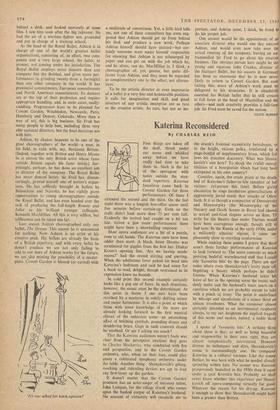Katerina Reconsidered
By CHARLES REID
FINE things are taken off the shelf, thrust under our noses and whisked away before we have really had time to take them in. Such is the lot of the operagoer with tastes outside the stan- dard repertory. Katerina Ismailova came back to Covent Garden for three performances. Of these I attended the second and the third. On the last night there was a longish box-office queue until five minutes before curtain-up. Even so the stalls didn't look more than 75 per cent full.
Evidently the revival had caught on a bit too late. Given a few more performances there might have been a snowballing response.
Most opera audiences are a bit of a puzzle, even to old hands. The Katerina ones have been odder than most. A black, bitter libretto was scrutinised for giggles from the first bar. Otakar Kraus's opening line, 'Are we having mush- rooms?' had the crowd stirring and purring. When the adulterous lover poked his head into Katerina's bedroom and said he had come for a book to read, delight, though restrained in its expression knew no bounds.
In cold print this second example certainly looks like a gag out of farce. In such situations, however, the,music must be the determinant. At this point in Scene 3 our ears have been ravished by a nocturne in subtly shifting minor and major harmonies. It is also a point at which those with some knowledge of the score are already looking forward to the first musical climax of the seduction scene—an astonishing affair of belching cymbals, pounding drums and shuddering brass. Gags in such contexts should be snubbed. Or am I asking too much?
That the Katerina audiences weren't fools was clear from the perceptive ovations they gave to Charles Mackerras, who conducted with fire and perspective, and to the Covent Garden orchestra, who, when on their toes, could play Many a celebrated symphony orchestra under the table. Another thing: Shostakovich's gibing, mocking and ridiculing devices are apt to lead any first-timer up the garden.
It doesn't matter that the Covent Garden producer has an actor-singer of uncanny talent, John Lanigan, for the village drunk who comes upon the bashed corpse of Katerina's husband. No amount of virtuosity will reconcile me to the drunk's frenzied eccentricity hereabouts, or to the bright, vicious pOlka, reinforced by a stage-boxful of supplementary brass, which fol• lows his macabre discovery. What was Shosta- kovich's aim here? To shock the (valid) suscep:' tibilities of a bourgeoisie which had long bee extirpated in his ‘own country? Consider, again, the crude priest at the death! bed of Katerina's father-in-law (another of he victims: rat-poison this time). Before givini absolution he sings incoherent generalisations flit aggressively jovial music that smacks of Offed• bach. It is as though a compatriot of DostoievskY and Moussorgsky (the Moussorgsky of thti Nursery and Death Scenes in Boris) had chosed to scrawl anti-God slogans across an ikon. Tb write for the theatre thus under Tsarism would' i have been courageous enough, though still ii bad taste. In the Russia of the early 1930s, undei' a militantly atheistic regime, it came un-' pleasantly close to crawling conformism.
While making these points I grieve that there aren't three further performances of Katerina to look forward to. The score contains so much, piercing, bodeful, warmhearted stuff that I could cite 'favourite bits' by the page. There are epi4 codes where even Shostakovich's levity pays oft begetting a beauty which perhaps he didn'i foresee. When Katerina's husband takes his leave of her in the opening scene the music sud- denly melts and the husband's tenor soars on a cantilena which we are probably meant to take with a pinch of irony. The point is underlined by whoops and ejaculations of a minor third on unison trombones. What the composer almost certainly intended as an instrumental raspberry always, to my ear, heightens the implicit tragedy of this scene and makes, indeed, a noble thing of it.
I spoke of 'favourite bits.' A striking thing about these is that, as well as being beautiful and stageworthy in their own right, they are almost symphonically interrelated. However diverse its techniques and dyes, Shostakovich's music is commandingly one. He composed Katerina in a cultural vacuum. Like the young Berlioz, he was born with what he needed already sprouting within him. No sooner was Katerina prosperously launched in the 1930s than it came under a tacit Kremlin ban. Probably we shall never know whether this experience put Shosta- kovich off opera-composing virtually for good. Whatever the reason for his dry-up, Katerina is enough to show that Shostakovioh might have been a greater than Britten.




























 Previous page
Previous page